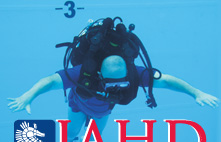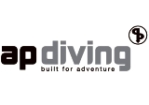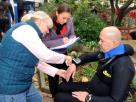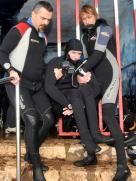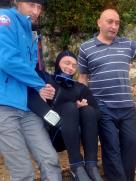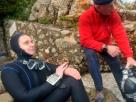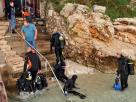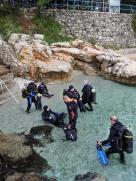NEWS & MOVIES ARCHIVE
From wheelchair under the surface to meet science demands
Handicapped divers form Slovenia, Croatia, Bosnia and Herzegovina and Serbia spend the weekend together with scientists from Faculty of Medicine Ljubljana at the diving centre in Kostrena, Croatia. The purpose of the diving camp was to gather the data that will help to research how cold water surrounding influences the health of the divers who had a spinal court injury.
The field study which was led by prof. dr. Zarko Finderle and Urska Gajsek, dr. med., is the second study ever carried out in the world about this topic and is the one with the most participant divers with spinal court injury so far. The diving team that was being monitored consisted of more than twenty experienced divers which completed around eighty dives in two days. The weather conditions did not spare anyone but the research condition was excellent. The first diving day was rainy and cold and the second one was sunny and nicely warm, which perfectly simulated everyday conditions in diving for both “alive” divers as well as their handicapped buddies.
Before, during and after the dives the measurements of air consumption, pulse during the dive, temperature of water and air, heart ultrasound, ECG, peripheral and core temperature were carried out on both handicapped divers and reference group of “the live ones”. The core temperature of the divers was measured for the first time on such a big group of divers with spinal court injury and was for the first time executed with technique usually used only on professional and military divers. All handicapped divers and their partners swallowed a sensor in a form of a pill (CoreTempÒ Temperature Sensor) that allowed researchers to monitor inner body temperature for both days.
The amount of gathered data was huge and the hard part of the research is yet to follow, that is why we will have to wait a little further to obtain final conclusions from the research, that will be presented on different layers to the scientific public. However it can already be concluded that there are no more big secrets to reveal when it comes to recreational diving for people with spinal court injury. In eleven years an educational system was developed that allows fast and efficient training to everyone willing. That is why from now one the question remaining is not anymore how to dive but what is happening inside the body of divers with spinal court injury (that are believed to be the most demanding group of divers) and what can diving beside a great filling offer to anyone who ever found underwater world.
On the other hand was the diving camp in Kostrena not only meant for handicapped divers but also for “sherpas” or the people who carry the equipment for handicapped divers to and out of the water. It is general knowledge that physical effort after the diving can negatively contribute to the effects on organism and Kostrena is a perfect place to measure the effect.
First unofficial results (ultrasound of the heart) already indicated that it is indeed “the sherpas” that are in the greatest danger and that is why we already contacted the city of Kostrena and Rijeka for help, so that in the near future the handicapped divers could access the sea with an elevator. The response was positive and we can only hope that we will once get to experience an elevator ride.
The biggest value of the field study was not the collection of the data but the people. Both handicapped and not handicapped divers who took part in the research made the weekend successful although the study was not financed or sponsored from Europe or local communities. At the end soldiers who once fought on the other sides of the guns dived together and it was diving that erased all prejudice and hard fillings from the past. Once more we proved that we can do anything although we are small and for many insignificant. This study once again confirmed that the leading position in handicapped diving remains firmly in the hands of the people living at the Adriatic Sea.
Main leaders of the study were:
- International association for handicapped divers IAHD Adriatic,
- Swimming club Slovenske Konjice,
- Institute for physiology, Faculty of medicine in Ljubljana
- The city of Slovenske Konjice kindly contributed the transport of the equipment with the driver,
- Targo d.o.o and Petr Butkovskiy
Branko RAVNAK
Photography:
Damir Skomrlj (CRO), PK Slovenske Konjice archive
13. 10. 2013
Production & design: Creativ, Novi mediji d.o.o.
